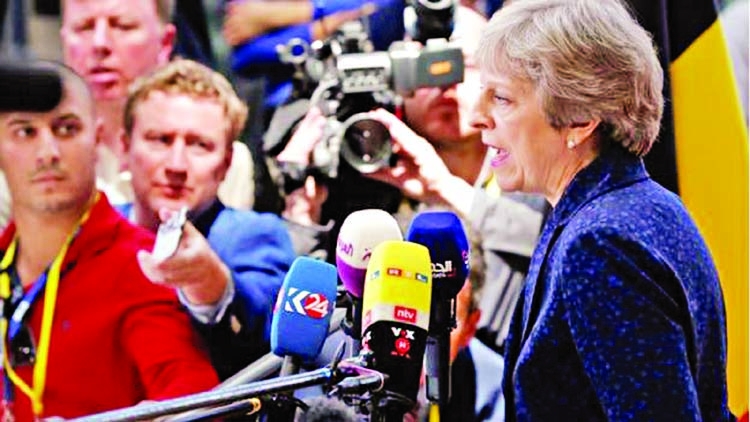Brexit: Barnier warns 'huge' differences remain in talks

Michel Barnier invited UK negotiators back to Brussels next Monday, warning: "The time is very short." Talks continue over the terms of the UK's withdrawal from the EU in March next year.
What happens to the Irish border remains a sticking point. The UK says agreement on vital security co-operation after Brexit is being blocked by EU negotiators.
Arriving on the second day of the European Council meeting on Friday, Mr Barnier said: "We have made progress but huge and serious divergence remains, in particular on Ireland and Northern Ireland."
* May warns EU: Put citizens' safety first
* Laura Kuenssberg: Can May persuade EU to relax its red lines?
* EU reaches migration deal in crunch talks
* Bank warning for EU over Brexit progress
He also said he hoped to see "workable and realistic" proposals from the UK on what the future relationship between the UK and EU should look like.
"The time is very short. We want a deal and are working for a deal, the time is short and I am ready to invite the UK delegation to come back to Brussels next Monday."
European leaders at the summit welcomed progress on the legal text of the withdrawal agreement but noted that "important aspects still need to be agreed" including the territorial application of the deal "notably as regards Gibraltar". Talks between Spain and the UK over Gibraltar, including access to its airport and the exchange of tax information, continue.
They also expressed concern that "no substantial progress has yet been achieved on agreeing a backstop solution for Ireland/Northern Ireland", if a deal on customs arrangements is not agreed by December 2020. when the transition period is due to end.
And they called on member states and EU institutions "to step up their work on preparedness at all levels and for all outcomes" - European Commission President Jean-Claude Juncker has said the EU must prepare for the possibility that no Brexit deal will be reached.
Prime Minister Theresa May has called her cabinet together for what has been billed as a make-or-break meeting at her country residence, Chequers, on 6 July to agree the UK's blueprint for its future relations with the EU.
Her own cabinet is divided over what the UK's customs arrangements after December 2020 should look like, when the transition period agreed with the EU is due to end.
And there are disagreements over the future movement of goods and people across the border between Northern Ireland and the Republic of Ireland.
On Thursday, Mrs May said a strong future partnership with the EU was in everyone's interests."I think both sides are keen to continue that work at a faster pace than we have done up till now and certainly we would welcome that," she said.
She added that the UK would publish a White Paper setting out "in more detail [the] strong partnership the United Kingdom wants to see with the European Union in the future".
But she urged fellow EU leaders to tell their negotiators the UK should be allowed to continue to take part in schemes like the Prum mechanism for sharing DNA profiles, the Second Generation Schengen Information System - a database of "real time" alerts about certain individuals - and the European Criminal Records Information System.
